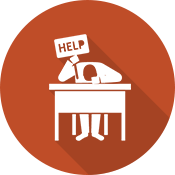What is a Comorbidity?
Comorbidity is the medical term for two or more disorders that occur at the same time. In general, individuals affected by ADHD often have other behavior disorders that impact their ability to function successfully. The comorbidity of ADHD with other disorders is between 60% and 80%.
Research has shown that
mood (e.g., depression) or anxiety disorders are present in 1/4 of all children with ADHD. These other disorders compound the typical issues associated with the symptoms of ADHD.

- Many people with ADHD also develop problems regulating their emotions in response to their disorder.
- Other research has shown that individuals with ADHD, both adults and children, are often impacted by other problems, such as increased risk-taking, substance abuse, and criminal behavior.
When comorbid conditions are present, it can make the diagnosis of ADHD much more difficult to pinpoint and the symptoms harder to treat. Some comorbid disorders that commonly occur alongside ADHD are:
- Oppositional Defiant Disorder
- Depression
- Anxiety
- Bipolar Disorder
- Conduct Disorder
- Sensory Integration Disorder
- Learning Disorder
- Early Speech/Communication problems

Substantial evidence from clinical and population trials shows a significant ADHD and
substance abuse comorbidity. The most commonly reported drugs used by ADHD patients are
alcohol and
marijuana, followed by
cocaine. However, the relationship is less pronounced when ADHD patients are treated with medication for their symptoms.
Therapists are Standing By to Treat Your Depression, Anxiety or Other Mental Health Needs
Explore Your Options Today
Ad
Oppositional Defiant Disorder (ODD)
Symptoms occur in as many as 21% to 60% of children with ADHD. ODD symptoms tend to occur more often with people whom the child is close to or knows well, such as family or caregivers.
Some of the behaviors associated with Oppositional Defiant Disorder include:
- Arguing with adults or refusing to comply with rules
- Frequently periods of anger, resentfulness, or vindictiveness
- Deliberately annoying others, and/or becoming easily annoyed with others
- Blaming others for his or her mistakes
Opposing Authority
Oppositionality to authority generally begins to appear well before adolescence and can indicate a true case of ODD, but it may also be a side effect of a child's difficulty interacting with his or her environment.
- The incredible frustration experienced in response to what the child with ADHD may see as "unreasonable" demands of the environment can trigger angry refusals.
- The child may not continue to behave in ways that are consistent with ODD once an appropriate course of treatment has begun. For more information on ODD, please click here.
Depression
10 to 30% of children with ADHD have a co-occurring mood disorder such as depression. Although many depressed adults move, think and talk slowly, children often demonstrate different symptoms when depressed.
- For example, children may show extreme impulsive and hyperactive behavior as well as irritability.
Causes

Environmental
Depression may be a reaction to environmental stressors associated with having ADHD such as viewing the environment as unpredictable, seeing peers as unfriendly and rejecting, or thinking that school is a negative and overwhelming place.
In these cases, a separate diagnosis and treatment strategy is not necessary because the depression is occurring in response to ADHD and will likely decrease when the ADHD symptoms are treated.

Family
In other instances in which depression may run in the family and be more directly linked to biological/genetic causes, a separate diagnosis and specific treatment for symptoms of depression would be more appropriate.
Diagnosing Depression with ADHD
Distinguishing between the emotional complications of attention deficit disorder and a separate depressive disorder may be very difficult. It is critical to:
- Look for indications of whether the depression or the ADHD symptoms came first and whether there is a history of depression or ADHD in the family.
- Conduct an evaluation of the severity of symptoms.
It is very important to take depressive symptoms seriously, regardless of their cause. Children with ADHD and depression
can have suicidal thoughts and any related statements or behaviors should be monitored and addressed by a mental health clinician. For more information on Depression, please
click here.
Anxiety Disorders
Approximately 25% of individuals with ADHD also have anxiety disorders.
Common symptoms of anxiety include:
- Unpredictable mood swings (i.e., someone is happy one minute and miserable the next).
- Excessive irritability.
- Frequent angry outbursts.
- A noticeable lack of energy at times.
- Low self-esteem (particularly when individuals with ADHD start to recognize their own limitations in comparison to others).
Other symptoms include:
- Frequent school absenteeism.
- Somatic (physical) complaints.
- Unwillingness to attempt new tasks.
- A sense of resignation regarding their decreased ability to perform various tasks.
Children with ADHD and anxiety disorders (or with co-occurring depressive disorders) may also display a general lack of motivation and a sense of learned helplessness, or the belief that their actions and intentions do not truly make a difference in their lives.
It is very important to distinguish between true anxiety disorders and those children who are experiencing anxiety in response to ADHD, because the treatment options are very different.
- Stimulant medications, while helpful for ADHD symptoms, may actually worsen the symptoms of true anxiety disorders. For more information on anxiety Disorders, please click here.
Bipolar Disorder
Bipolar disorders may co-occur with ADHD or may mimic its symptoms. About 1/2 of boys and 1/4 of girls with bipolar disorder also meet the criteria for ADHD. Children and adolescents with bipolar disorder often show:
- Impulsive inattention and hyperactive behavior.
- Extremely strong feelings.
- An overbearing manner.
- Irritability.
- Difficulty waking up in the morning.
Children and adolescents with severe bipolar symptoms may have excessive and lengthy temper tantrums that are destructive, and often based on gross distortions of objective events.
- For example, when a friend wants to play a different game, the bipolar child may think that his friend is trying to purposefully be mean.
- The child's anger at such mistreatment may result in an extreme temper tantrum.
Again, it is critically important to reach an accurate diagnosis.
- The stimulant medication used to treat ADHD is not usually helpful for bipolar disorder and will likely exacerbate the symptoms.
- Lithium (one of the most frequently used medications to treat Bipolar Disorder) is usually much more helpful to children who are truly bipolar. For more information on Bipolar Disorder, please click here.
Conduct Disorder
Conduct disorder involves serious behaviors such as:
- Aggression towards people (including fighting) or animals.
- Destruction of property.
- Deceitfulness or theft.
- Serious violations of rules (e.g., staying out late at night, running away from home, or skipping school).
As many as 25% to 40% of children with an ADHD diagnosis that includes hyperactivity also meet the criteria for a Conduct Disorder. The rate of conduct disorder in those ADHD children without hyperactivity is significantly lower. For more information about Conduct Disorder, please
click here.
Learning Disorder
Over 1/2 of all children with ADHD also have a learning disorder. ADHD, though it affects the ability to learn, is not a true learning disability. So, treating the symptoms of ADHD will not correct any learning disorders that a child may have.
Learning disabilities are specific disorders that affect one of the four primary steps needed for learning:
- Recording information
- Input; e.g., visual or auditory perception problems.
- Understanding information
- Integration; e.g., sequencing and organizing problems.
- Storing information
- Placing information into memory.
- Retrieving information
- Memory; e.g., the immediate recall of recently learned information.
Although ADHD may globally interfere with the success of these steps, it is the impulsivity, hyperactivity and distractibility that interfere with the learning process, not a specific disorder that impacts one of these 4 steps.
An inability to sustain attention resulting from ADHD, combined with a learning disorder can make school very challenging and frustrating for children.

Behavioral problems, such as fighting in the school yard or resisting authority, can impede a child's academic progress.
 Learning disabilities require specific intervention separate from the treatment of ADHD.
Learning disabilities require specific intervention separate from the treatment of ADHD.

Compounding factors need to be carefully weighed before making decisions about treatment or school placement.
Autism Spectrum Disorders
Autism is a disorder of childhood that is characterized by extreme impairments in social interaction and communication problems combined with dramatically limited activities and interests.
Intelligence is often impaired, and the ability to learn and utilize new information is markedly restricted.
Behavioral symptoms may include:
- Hyperactivity.
- Aggressiveness.
- Impulsivity.
- A short attention span.
- Temper tantrums.
Autism and ADHD
Similarities between autism spectrum disorders and ADHD can lead to early childhood diagnoses that suggest both are present. As the child ages, however, differences become more distinct and one disorder or the other often emerges as the true condition.
Children with autism typically become more withdrawn and continue to have absent or poor social skills. Any hyperactivity that is present may be mitigated by environmental changes (e.g., adhering to a strict routine).
In contrast, children with ADHD rarely calm down without medication, even though their social and communication skills can eventually catch up to their peers. These developmental differences in the ongoing symptoms in each disorder aid in distinguishing between the two.
Problems with Diagnosing ADHD
The high comorbidity rate between ADHD and other disorders has essentially created confusion regarding the definition of a "true" ADHD diagnosis.
- Since most children or adults with ADHD also have a second diagnosis, and both sets of symptoms frequently overlap, critics suggest that the nuances of ADHD have not been adequately described.
Some even suggest that making an early (i.e., when a child is very young) ADHD diagnosis is inappropriate.
For instance, the recently identified condition of "early-onset Bipolar Disorder" (not yet recognized by the DSM) mimics ADHD in the areas of impulsivity, mood inconsistencies, and hyperactivity.
- It may not be clear whether very young children suffer from ADHD, early-onset Bipolar Disorder, or another condition that mimics ADHD symptoms. Obviously, establishing an accurate ADHD diagnosis is very challenging for even the best clinicians!






![]()
![]() Learning disabilities require specific intervention separate from the treatment of ADHD.
Learning disabilities require specific intervention separate from the treatment of ADHD.![]()
